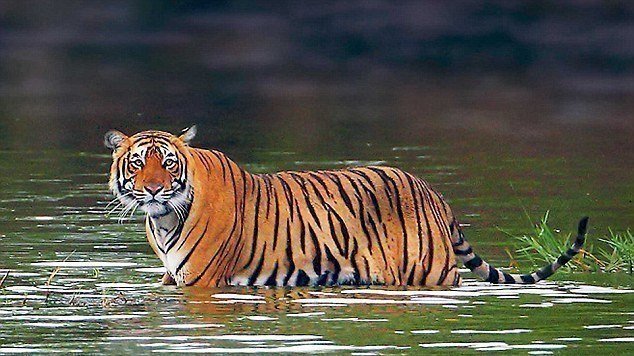Not only is tiger a beautiful animal but it is also the indicator of the forest's health. Saving the tiger means we save the forest since tiger cannot live in places where trees have vanished and in turn secure food and water for all.
If we make sure tigers live, we have to make sure that deer, antelope and all other animals that the tiger eats (its prey base) live. To make sure that these herbivores live, we must make sure that all the trees, grass and other plants that these prey animals need for food are protected. In this way, the whole forest gets saved! Saving the tiger means saving its entire forest kingdom with all the other animals in it.
Also forests catch and help store rainwater and protect soils. In this way we protect our rivers and recharge groundwater sources. Areas with less trees lead to floods, killing people and destroying homes. It takes away the precious soil, leaving behind a wasteland. The soil jams up our lakes and dams, reducing their ability to store water. By destroying the tiger's home, we not only harm tigers, but also ourselves.
The tiger thus becomes the symbol for the protection of all species on our earth since it is at the top of the food chain. This is why we sometimes call the tiger, an apex predator, an indicator of our ecosystem's health
Our survival is dependent on the natural environment as it provides us with clean air, food and water. Tigers are at the apex of the food pyramid and are indicators of a healthy environment. The ‘Web of Life’: all things in nature, including humans, are interrelated - changing any component of the web will impact others. In saving the tiger we are protecting the entire ecosystem and all its inhabitants.
We should save tigers because:
- A home for tigers = a home for others
With just one tiger, we protect around 100 sq km of forest.
To save tigers, we need to protect the forest habitats across Asia where they live. And by saving these places, we will not only allow tigers to roam freely, but also many other endangered species that live there and form the very thing that makes our planet unique – biodiversity.
- Healthy tiger populations = healthy ecosystems
As a large predator, the tiger plays a key role in maintaining healthy ecosystems.
These ecosystems supply both nature and people with fresh water, food, and many other vital services – which means by saving the tiger, we are helping people too.
How's that for a win-win deal?
- Tigers are a lifeline for many people
Tigers can directly help some of the world’s poorest communities.
For one thing, where tigers exist, tourists go. And where tourists go, money can be made by communities with few alternatives for making a living.
Tiger conservation projects also help provide other alternative livelihoods for rual communities, that are not only more sustainable but which can raise income levels too.
- The tiger is a survivor
The tiger has evolved over thousands of years.
Now this big cat is being trapped, skinned, and pushed out of its home. And yet it clings to survival, barely, in a few patches of forest scattered across Asia.
That's enough of a reason to give this species a fighting chance to make it into the next decade.
Regards
Gaurav 

Hi! I am a robot. I just upvoted you! I found similar content that readers might be interested in:
http://endangered-tiger.blogspot.com/2010/02/why-should-we-save-tigers.html